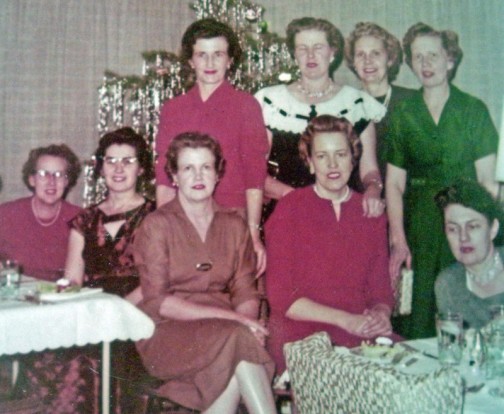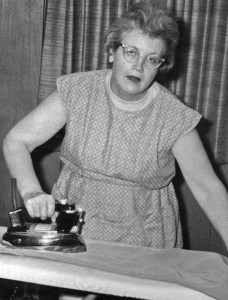All have passed on, but I remember their names: Bertha, Beth, Gladys, Nora, Theresa, Maxine, Dorothy, Mae, and of course my mother Cora. They were members of what was known simply as “The Club”—and how it got started, I have no idea. I remember that Theresa, being a native of Price, was a charter member while others, like my mom, were inducted as adults. All were stay-at-home housewives except Dorothy, who taught music at the high school, and Bertha, who clerked part time at Price Trading Company. Those two, at least, had a life outside the home, whereas the rest were domestic shut-ins. Which is precisely why monthly gatherings of The Club were so vitally important. It was an excuse to bring out the fine china, to dress up, to enjoy tea and cake, to indulge in feminine chitchat and for one bright shining evening imagine what life might be like had they not become saddled with families.
All had husbands to whom they were permanently bound, like it or not. I know for a fact, having had big ears as a child, that at least one of those husbands was—in the vernacular of the day—“stepping out.” In my mind’s eye, I pictured some guy dressed up in white tie and tails, skipping out the door with a tip of the top hat—like Eddie Cantor off to makin’ whoopee. Hard to imagine such a thing ever taking place in my neighborhood, but, then, I also had a big imagination.
Twice a year the ladies would be joined by their husbands—except for the one whose husband had gone AWOL—for an Easter Sunday egg roll and a midsummer campout. We, the so-called Kids of The Club, were of course invited to participate; however, whenever one of our mothers hosted club night, we were expected to lay low like mice in the basement. Our fathers? Who knows where they went? Except for the one who was steppin’ out, all they had in the way of a social life was the annual deer hunt, during which time they were permitted to smoke cigars, drink whiskey and share ribald stories. Oh, and there was also Fred’s Barber Shop, which was off-limits to women. What you did at the barber shop, basically, was review the previous year’s deer hunt and lay plans for the next.
As their children grew older, some of the housewives began to feel free to venture out of the house. In my mother’s case, it wasn’t a giant step from the kitchen; however, she greatly enjoyed the companionship of her fellow school lunch ladies.
The woman known as “Bessie down the Street,” turned her living room into a beauty parlor, after which her poor husband John was banished to the basement forever. Iva Lou successfully relocated her husband in the garage, which allowed her to run free whilst hubby engaged in welding and auto repair. It was Iva Lou who loaned my mother her paperback copy of Grace Metalious’s book “Peyton Place.” Don’t know if Mom ever got around to reading it, but of course I did, having long been aware of all her hiding places. Also, I had more time to read than Mom ever did, what with all her cooking, housekeeping, laundry and ironing chores.

